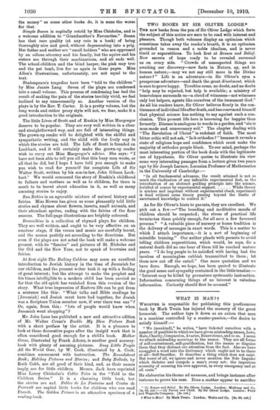TWO BOOKS BY SIR OLIVER LODGE.* THE new books from
the pen of Sir Oliver Lodge which form the subject of this notice are sure to be read with interest and pleasure. Though both volumes display an optimism which
sometimes takes away the reader's breath, it is an optimism grounded in reason and a noble idealism, and is never timid or superstitious. To look first at Reason and Belief.
New secrets of hope ready to be revealed surround us on every side. " Crowds of unsuspected things are awaiting our discovery—new facts in Nature, ay, and in human nature;—may we not say still more in the Divine nature ? " Life is an adventure—in Sir Oliver's eyes a prosperous adventure—and death the great dOnoiment, which is sure to prove happy. Troubles come, no doubt, and no doubt " help may be rejected, but help is available; a ministry of benevolence surrounds us—a cloud of witnesses—not witnesses only but helpers, agents like ourselves of the immanent God." As all his readers know, Sir Oliver believes firmly in the con- tinuance of individual life after death, and has convinced himself that physical science has nothing to say against such a con- clusion. This present life here is becoming far happier than formerly. Disease is analogous to weeds in a garden, and "sin is man-made and unnecessary evil." The chapter dealing with "The Revelation of Christ" is redolent of faith. The most bitter critic will not ask, " Is it orthodox ? " because it reveals a state of religions hope and confidence which must make the majority of orthodox people blush. To our mind, perhaps the most interesting portion of the book deals with the legitimate use of hypothesis. Sir Oliver quotes to illustrate his view some very interesting passages from a lecture given two years ago by Sir Joseph Larmor, Lucasian Professor of Mathematics in the University of Cambridge :- "In all fundamental advances, the result attained is not so much the vindication of any inflexible experimental fact, as the introduction of an abstract guiding principle into the science,
fortified of course by experimental support While theory is aimless and impotent without experimental cheek, experiment is dead without some theory passing beyond the limits of ascertained knowledge to control it."
As for Sir Oliver's hints to parents, they are excellent. We pick out a few :—" The brooding and meditative moods of children should be respected; the stress of practical life terminates them quickly enough, for all save a few favoured persons." " A valuable piece of nursery or home tradition is the delivery of messages in exact words. This is a matter to which I attach importance,—it is a sort of beginning of scientific training." Our author pleads with parents to avoid
telling children superstitions, which would, he says, die- a natural death did no one bear of them till he reached mature
years. "I do beg people to be satisfied with having had the incubus of meaningless rubbish transmitted to them ; let them now cut off the entail." One more quotation and we have done. Enough, we hope, has been quoted to illustrate the good sense and sympathy contained in the little treatise:— " Interest may be killed by premature systematic instruction. Information concerning things of no interest is valueless information. Curiosity should first be aroused."


























































 Previous page
Previous page